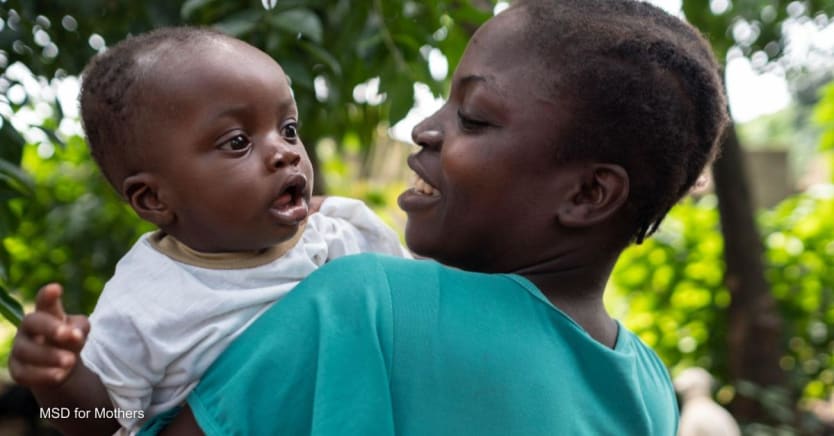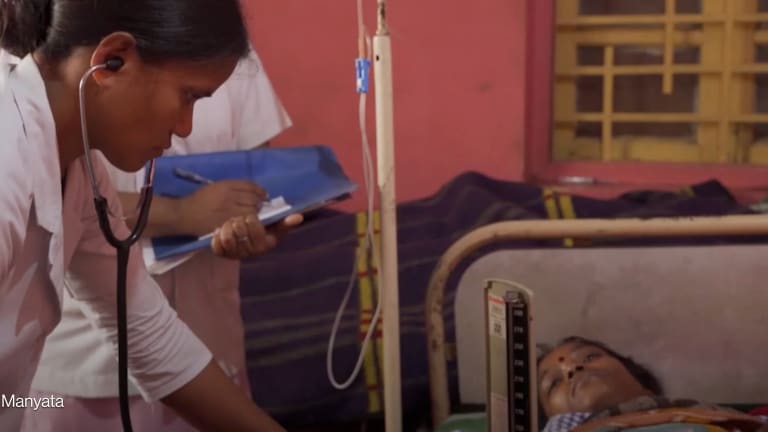Expanding health insurance to broaden access to maternal care in Nigeria

Nigeria accounts for over a quarter of maternal deaths globally each year. Evidence shows that maternal deaths in Nigeria can be linked to shortage of medical professionals and supplies, limited access to a broad range of quality family planning methods, delays in receiving adequate care, and poor socioeconomic conditions limiting women’s access to quality maternal care.
Dr. Kelechi Ohiri, director general and CEO of Nigeria’s National Health Insurance Authority, is at the forefront of tackling these issues by improving access to health insurance as the country works to move toward universal health coverage.
Ohiri was appointed in February to NHIA, which was formed by the establishment of Nigeria’s National Health Insurance Authority Act of May 2022. One of its stipulations is that all citizens must get health insurance, with estimations that only 3% of people in Nigeria aged between 15 and 49 had health insurance before the act. But there’s a long way to go, with still less than 10% of the population covered as of September 2024.
Ohiri spoke to Devex about the importance of health insurance in extending access to maternal health care in Nigeria, including among the poor and vulnerable.
This conversation has been edited for length and clarity.
How would you describe the current state of access to maternal health care in Nigeria and the challenges faced in this area?
Nigeria has among the highest levels of maternal deaths globally, with about 80,000 women dying from pregnancy-related complications in 2020. There’s also a lot of maternal morbidity, which gets less attention. You can look at the root causes in the context of delays to treatment correlated with socioeconomics, the agency and empowerment of women, and the availability of health services.
A significant part of our focus at NHIA is on the fact that one reason many people don’t go to a hospital is because of the fear they won’t be able to afford care. To intervene, one needs to look at both interventions to reduce maternal mortality, and interventions that enhance financial protection for poor and vulnerable women.
What role does health insurance play in reducing out-of-pocket payments, and improving maternal health outcomes?
We have to be intentional about the equity dimension, looking at vulnerable members of the population. In line with this, part of the National Health Insurance Authority Act involved establishing a Vulnerable Group Fund to subsidize the provision of health care services to vulnerable groups in Nigeria, meaning they are not required to pay contribution fees for insurance. This group of 83 million Nigerians includes pregnant women, who are more likely to suffer complications or death if they don’t have financial access to care.
We’ve also set up a strategic purchasing mechanism whereby we pay for care for women who experience maternal complications, and then ensure they get enrolled in insurance covered by the Vulnerable Group Fund afterwards. We have, for example, been piloting this scheme for women who suffer from obstetric fistula. Since August 2024, over 1,000 women have had their treatment covered and subsequently enrolled in health insurance.
How are you ensuring that health care facilities have the resources they need to provide high-quality maternal care?
First, through the national health act, the Nigerian government has earmarked no less than 1% of its consolidated revenue for primary care. This includes financing for health insurance and for the Nigeria Primary Health Care Development Agency, with which we collaborate a lot and which focuses on ensuring that primary care facilities are service-ready. That means having the right complement of human resources, midwives, and community health workers, but also medicines, other commodities, and decent facilities.
In addition, we carry out accreditation of providers and referral centers where emergency obstetric and care services are provided. We have a checklist of what we look at to ensure that where people go; these services can actually be offered and accredit facilities when they meet certain quality criteria.
In what ways do you work with private sector entities to reach underserved populations?
One example is an initiative such as our obstetric fistula program. In Nigeria, obstetric fistula is a major problem for women experiencing complications from childbirth. Comprising an abnormal opening between the vagina and rectum due to prolonged obstructed labor, the injury is estimated to affect about 13,000 women in the country annually, with a treatment backlog of some 400,000 cases.
With initiatives like the obstetric fistula program, NHIA is subsidizing care and treatment for these marginalized women; some care providers are private sector players, including nonprofits. We also work with health maintenance organizations, which we engage as administrators and as independent verifiers of claims by health providers, helping build in transparency and accountability to what we do.
I was able to meet a woman at an obstetric fistula center in one of the country’s states who was enrolled in and benefited from the subsidized health care she received. She talked about how horrible the stigmatization of obstetric fistula was, and about being depressed, but with the surgery she received, she felt like she was a new person. She had a new lease of life and a new reason for being.
In addition, we’re looking at how we make the private health insurance market more efficient, so that providers go after the informal sector, covering poorer, vulnerable people whose premiums could be paid for by us or associations who could come together and pay them for people.
From a regulatory perspective, we’re aiming for the mandate of health insurance to be honored, using market principles to ensure that people have a choice, and nobody can be denied from enrolling in any health insurance program, whether public or private.
How are you ensuring community buy-in and participation in the programs you’re running?
There are three main things we’re doing. The first is trying to enforce the mandate of having health insurance. For the poorest and most vulnerable, we’re working with local governments to get them covered, in addition to counterpart funding that they provide to the basic health care provision fund.
The second thing is increasing awareness. We’ve been leveraging primary health care centers as places to educate people about insurance when they seek care. We also work with counterparts in the various Nigerian states to go to local governments and create outreach initiatives. Furthermore, we’ve seen cases where hospitals have taken on these awareness-raising initiatives, with one obstetric fistula hospital creating jingles and videos in the local language for radio broadcast, which aired on local network stations and WhatsApp.
The third thing is establishing trust, partly through encouraging traditional leaders in communities to leverage the success of programs like those for eradicating polio. This means that when a woman is pregnant or in labor and needs care, they know they have someone to trust and can get to a hospital. We’re also working to make sure that people in need trust when they get to a hospital that they will be attended to and won’t have to pay out of pocket.
What’s the program’s ambition over the next five to 10 years?
We have a strong mandate to ensure we enroll the last mile intentionally, not waiting to just cover those who can pay before enrolling the poor and vulnerable. We want financial protection to extend to a much bigger chunk of the population. If we can ensure the mandate is enforced, I think we can do much better than the coverage of around 3% we’ve had all these years.
For me, success in the next five years would be if we see a marked reduction in maternal mortality in the Nigeria Demographic and Health surveys, as well as an improvement in the quality of maternal care, and fewer women being denied care or not seeking it because they’re afraid of cost.
The Funding the Future series is supported by funding from MSD, through its MSD for Mothers program, and is the sole responsibility of the authors. MSD for Mothers is an initiative of Merck & Co. Inc., in Rahway, N.J., U.S.A.
Join the conversation on finding private sector solutions to improve health service delivery for reproductive, maternal, newborn, child, and adolescent health (RMNCAH).

Search for articles
Most Read
- 1
- 2
- 3
- 4
- 5








